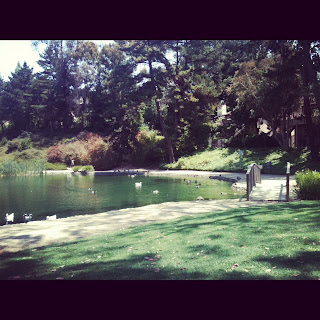On Calling and Cultivating Mustard Seeds
“Oh, so you’re completely messed up right now,” she replied when I told her about the study abroad program I had just returned from, more of a statement than a question. She sat cross-legged in the corner of our on-campus apartment, the soles of her thrift store sneakers worn and ragged, unaltered like her gray-streaked hair.
“Yes, I’m completely messed up,” I responded,
unapologetically.
“Wait, what?” “Yeah, Aly, what?” My friends wondered, but I
offered nothing more.
She gave me a smile and I knew right then that we shared a
secret language, a code.
A code that would bring me back from the edge.
***
I have a friend and mentor who is incredible with college
students. When I came back from a traumatic study abroad experience, she was
the only one who understood right off the bat. She saw my questions about God
and the church and U.S. foreign policy as engagement of my faith, not a
rejection of it. She saw my anger as a sign of compassion, not rebellion. She
listened, she validated, she understood my shopping guilt and inability to open
my Bible. She challenged me to move beyond the anger. She called me out of
wallowing. She demonstrated a life of compassion and intentionality. She gave
me hope in the body of Christ.
When I graduated she gave me a present, a small, glass
picture frame that at first glance looks empty. But if you look hard enough, in
the center of the white paper backing is a small yellowish dot—a mustard seed. It’s
tiny, smaller than I pictured when we recited the verse in Sunday School, “I
tell you the truth, if you have faith as small as a mustard seed, you can say
to this mountain, 'Move from here to there' and it will move. Nothing will be
impossible for you." (Matthew 17:20)
In an angry, questioning, depressed college student, she saw
and cultivated a mustard seed of faith.
.JPG) Recently I had lunch with her and the topic of calling and
vocation came up. She said to me of her work with college students, of the
shattering and rebuilding of worldviews, of developing a faith of our own, “I
could do that cycle over and over again, forever.”
Recently I had lunch with her and the topic of calling and
vocation came up. She said to me of her work with college students, of the
shattering and rebuilding of worldviews, of developing a faith of our own, “I
could do that cycle over and over again, forever.”
It wasn’t just me that she impacted. Her faith in me
transformed my life and, in turn, spilled over into my relationships, my
career, my spheres of influence. And it’s not just me that she’s mentored. I
can’t even begin to count the number of students who would call her a most
trusted friend and mentor.
She has a calling, a vocation, to work with college
students.
When I think of Frederick Buechner’s wise words, “The place
God calls you to is the place where your deep gladness and the world’s deep
hunger meet,” I think of my mentor.
I think of the deep gladness she finds in friendship with college
students. I think of the deep hunger for understanding and connection I felt
when I returned from Central America, broken and despondent. I think of the
mustard seed that blossomed into a flourishing tree in my life and in the lives
of so many other students.
That is what I want to find. A calling that brings me deep
gladness and meets the world’s deepest hungers. I have ideas of what this looks
like. I experienced it for a time at Plant With Purpose, finding deep gladness
in writing for an organization that meets deep hunger in developing countries.
As I move forward, I will continue to keep my eyes peeled
and my spirit open to the mustard seeds of hope, of joy and faith that God is
calling me to cultivate in the world around me.


.JPG)





.JPG)

















